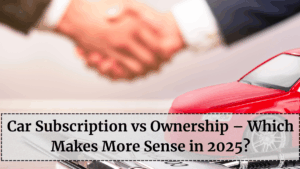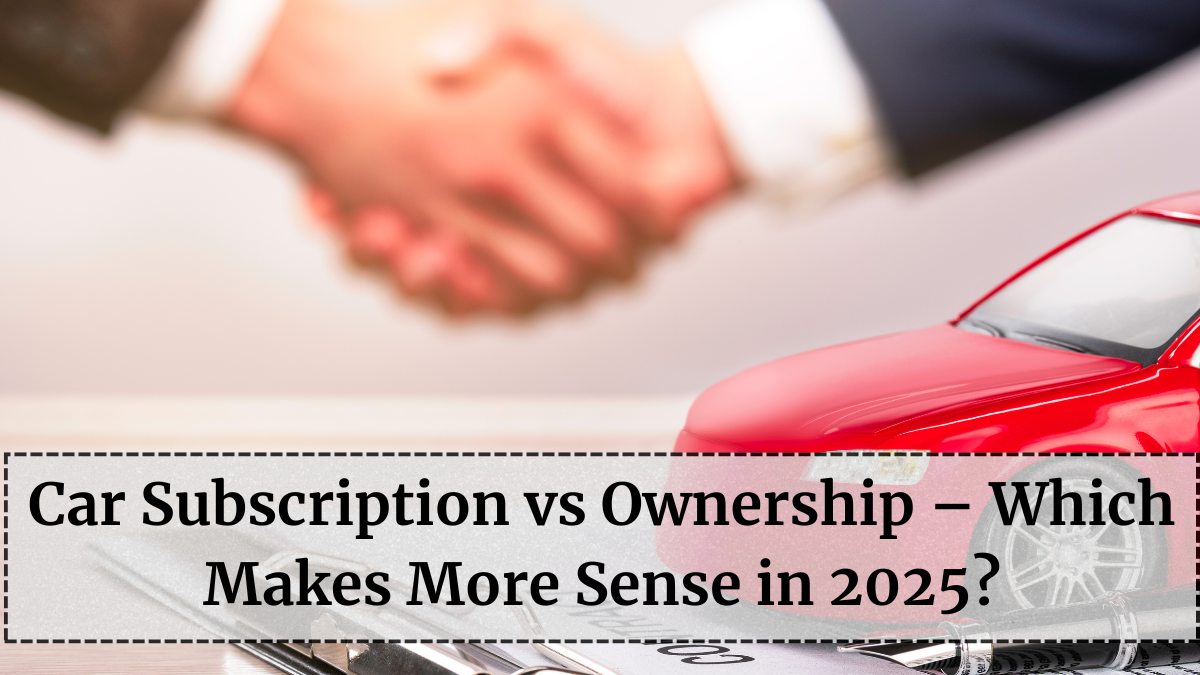The way people use cars is changing fast. In 2025, more drivers are subscribing to cars instead of buying them, marking a dramatic shift in automobile ownership culture. With rising fuel prices, maintenance costs, and the rapid evolution of car technology, many urban users now prefer flexible car subscriptions that work like Netflix — drive, pay monthly, and cancel anytime.
But is a car subscription really better than owning one? Let’s break down both models and understand which makes more sense for modern drivers.

What Is a Car Subscription?
The Concept
A car subscription is a flexible monthly plan where users can access a car without long-term ownership commitments. The monthly fee typically covers insurance, maintenance, taxes, and roadside assistance — all bundled in one payment.
Unlike leases or loans, subscriptions allow drivers to switch vehicles, pause services, or upgrade models easily. It’s a perfect fit for urban professionals, expats, or families who value convenience over ownership.
How It Works
-
Choose your preferred car model online.
-
Pay a monthly subscription fee (starting around ₹20,000–₹60,000 depending on the model).
-
Get doorstep delivery and use the vehicle for as long as needed.
-
Cancel, upgrade, or return anytime.
Companies like Zoomcar, Revv, Quiklyz (by Mahindra Finance), and Maruti Subscribe have made car subscriptions mainstream in India by 2025.
Benefits of Car Subscriptions
1. Zero Down Payment
Unlike buying or leasing, subscriptions require no upfront cost. You simply pay the monthly fee and start driving — ideal for those avoiding long-term financial commitments.
2. No Maintenance or Insurance Hassles
Maintenance, repairs, and insurance renewals are handled by the provider, saving both time and unexpected costs.
3. Flexibility to Switch Cars
You can easily switch models or brands depending on lifestyle needs — from a compact hatchback for city drives to an SUV for family trips.
4. Ideal for Short-Term Use
Whether you’re in a new city for a year or just testing out an EV, subscriptions let you drive without worrying about resale or depreciation.
5. All-Inclusive Costs
Fuel aside, your monthly subscription covers everything — insurance, service, roadside support, and registration.
Why Ownership Still Matters
1. Long-Term Savings
While subscriptions are convenient, buying a car outright can still be cheaper in the long run. After paying off a loan, ownership means zero monthly EMIs.
2. Full Control
Owners can modify, customize, or sell their cars anytime. Subscription users, however, must follow provider rules and return cars in specific conditions.
3. No Usage Limits
Car owners have no restrictions on mileage or travel zones, whereas subscription models often include usage caps or penalties for exceeding limits.
4. Asset Value
Even as cars depreciate, ownership adds an asset to your portfolio — something subscription users never gain.
5. Ideal for Rural and Frequent Drivers
In regions with limited subscription access or high travel frequency, owning a car remains more practical.
Subscription vs Ownership: Detailed Comparison
| Feature | Car Subscription | Car Ownership |
|---|---|---|
| Initial Cost | No down payment | High (down payment or full price) |
| Monthly Cost | Fixed, includes maintenance & insurance | EMI + service + insurance |
| Flexibility | High – switch or cancel anytime | Low – long-term commitment |
| Maintenance | Covered by provider | Owner pays for upkeep |
| Mileage Restrictions | Often limited | Unlimited |
| Resale Value | None | Recoverable (resale) |
| Ideal For | Urban users, short-term, flexibility seekers | Long-term users, frequent travelers |
Market Trends in 2025
Urban Mobility Revolution
The subscription economy is expanding rapidly across India’s metro cities. Millennials and Gen Z drivers prefer access over ownership, aligning with global trends.
Integration with EVs
Car subscriptions are playing a major role in EV adoption. Users can test electric cars like Tata Nexon EV or MG ZS EV for months without committing to purchase.
OEM-Backed Programs
Automakers like Hyundai, Maruti, and Mahindra now operate their own subscription programs, ensuring brand trust and better service support.
Corporate Fleet Models
Many businesses are shifting from owning to subscribing, allowing employees to access shared or dedicated vehicles with maintenance handled centrally.
Which Option Makes More Sense in 2025?
For most city dwellers, car subscriptions make more sense — offering flexibility, convenience, and freedom from ownership headaches. It’s a smart choice if you:
-
Drive occasionally or live in metro areas.
-
Prefer trying new models or EVs.
-
Don’t want the burden of loan EMIs and service costs.
However, if you travel long distances frequently, live in smaller towns, or prefer full control, car ownership remains the more practical and cost-effective option.
The future might lie in hybrid models, where people switch between subscription and ownership depending on their lifestyle phase — giving them the best of both worlds.
FAQs
Is subscribing to a car cheaper than owning one?
In the short term, yes. But over a long period (3–5 years), ownership becomes more cost-efficient due to resale value and lower recurring costs.
Can I buy a car I’ve been subscribing to?
Yes, many providers offer a buyout option, letting you purchase the car after the subscription period ends.
Are car subscriptions available in smaller cities?
Currently, they are concentrated in metros like Delhi, Mumbai, Bengaluru, and Chennai, but expanding to Tier-2 cities by 2026.
What happens if I damage a subscribed car?
Minor repairs are covered under insurance, but major damages or negligence may result in additional charges per the provider’s terms.
Do subscription cars include EVs?
Yes, almost all platforms now include electric vehicles in their fleets to promote eco-friendly driving and test adoption rates.
Click here to know more.
